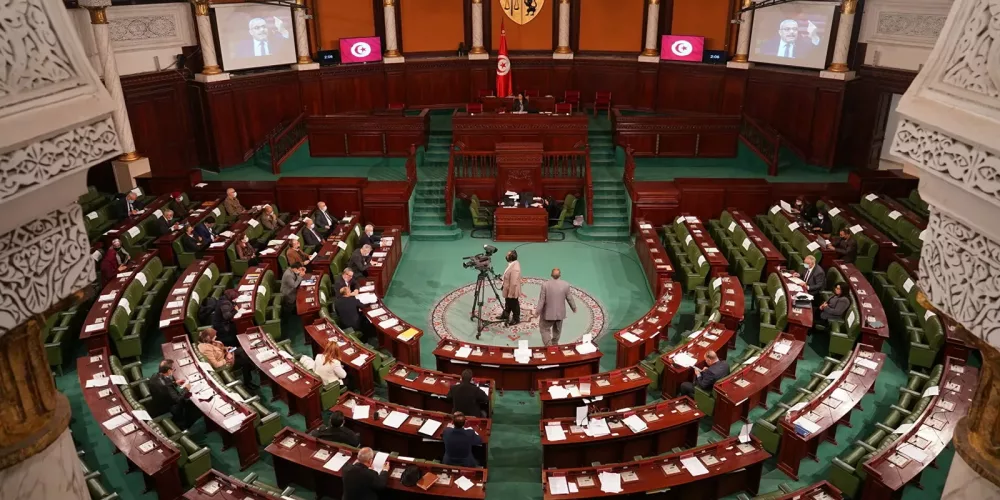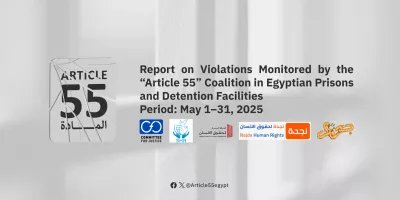The Committee for Justice (CFJ) said that on September 20th, a group of Tunisian parliament members submitted a proposed law to amend the basic law concerning elections and referenda. This amendment seeks to transfer electoral disputes from the Administrative Court to the Court of Appeal in Tunis. The proposal was presented to the Tunisian Parliament’s Bureau, which referred it to the General Legislation Committee with an urgent request for review. This comes at a critical time, just weeks before the presidential elections scheduled for October 6, 2024.
The draft includes fundamental changes in how electoral disputes are handled. It proposes procedures to expedite the review of appeals and hasten the resolution process. The proposed law includes several provisions aimed at restructuring the electoral dispute system, shifting jurisdiction from the Administrative Court—which has been the primary judicial body responsible for electoral disputes—to the Court of Appeal in Tunis. Additionally, the amendment stipulates that accepted candidates can appeal decisions made by the Independent Election Commission before the Court of Appeal within 48 hours of the decision. Upon receiving the appeal, the court registry will promptly record it and refer it to the Chief Justice of the Court of Appeal, who will assign a specific chamber to review it urgently.
Under the proposed amendments, the Court of Appeal must issue its ruling within a short timeframe, as part of an effort to expedite the resolution of electoral disputes before the vote. Notably, these procedures will apply to ongoing electoral disputes, even those that have not yet been decided by the Administrative Court. This means the Court of Appeal will be tasked with resolving all cases related to the 2024 presidential elections.
The parliamentarians who submitted the proposal argued that the amendment addresses the inconsistencies and conflicts they observed between the decisions of the Election Commission and the Administrative Court regarding electoral disputes. According to their interpretation, this situation has led to tensions that could negatively impact the electoral process and threaten its stability. They pointed out that some judges from the Administrative Court have made statements suggesting pre-existing biases in electoral disputes, undermining judicial impartiality. Therefore, they believe transferring disputes to the Court of Appeal would help avoid potential crises and ensure justice is delivered faster and with greater transparency.
The proposal has sparked widespread outrage across all sectors of Tunisian civil and political society. Many views this amendment as undermining the rules of the electoral process and disrupting its democratic flow. Presidential candidates Zohair Maghzaoui and Ayachi Zammal were among the first to openly oppose the amendment, issuing a joint statement expressing their complete rejection of the proposal. The statement emphasized that it is neither legally nor ethically permissible to amend electoral laws less than a year before elections. They stressed that this amendment, proposed between the start of the electoral campaign and the upcoming vote, amounts to “changing the rules of the game mid-play.”
The Tunisian Judges Association also strongly opposed the proposed amendment, calling it a serious violation of judicial independence and a blow to the foundations of the democratic system. In a statement, the association condemned the accusations against judges of the Administrative Court for allegedly lacking impartiality, dismissing these claims as baseless and unjustified. The association warned that the amendment opens the door to political interference in judicial decisions concerning electoral disputes, which could undermine the rule of law and erode public trust in democratic institutions. They cautioned that transferring disputes to the Court of Appeal could set a dangerous precedent, leading to future changes aimed at controlling the judiciary.
The Tunisian General Labor Union (UGTT), the country’s most prominent trade union organization, also issued a statement rejecting the proposed law. They argued that the timing of this amendment is inappropriate, noting that the electoral campaign has already begun, and changing the electoral rules now casts doubt on the fairness and independence of the Administrative Court, which has been responsible for handling electoral disputes for years. The union called on parliamentarians to retract the amendment and stop introducing legislative proposals that harm the country’s stability at such a sensitive time.
Likewise, the head of the Tunisian Bar Association, Hatem Mezgheni, expressed his opposition to the proposed amendment. Although he had not been formally briefed on its details, he voiced concerns that the amendment changes the electoral rules shortly before the elections, reflecting an intention to disrupt the electoral process. Mezgheni emphasized the importance of upholding the values of fairness and transparency, insisting that any changes to electoral laws should be made well in advance of elections to avoid undermining public trust in the democratic process.
CFJ believes that this amendment comes at a time when Tunisia faces significant political and economic challenges. Many observers have expressed concerns that the amendment could destabilize the country and heighten political tensions among various factions.
CFJ further asserts that the Tunisian executive authority continues its attempts to penetrate and influence the judiciary’s independence, exacerbating the crisis of undermining the people’s will, which seeks free, fair, and pluralistic elections that would establish a democratic and legitimate leadership that unites Tunisians. Additionally, the legislative initiative suffers from “unconstitutionality,” as it violates Articles 75 and 76 of the Constitution of July 25, 2022, and contradicts the basic law governing the Independent Election Commission concerning the exclusive jurisdiction of the Administrative Court over electoral disputes.
The timing of this initiative also raises questions about its motives and the extent to which it responds to objective necessities. CFJ considers this amendment a “fundamental breach” of the integrity of the electoral process and a severe violation of best practices related to elections, which prohibit amendments to electoral laws during the election year. The organization views this as a “suspicious move” aimed at influencing the electoral process in favor of certain parties. Rushing the review process without allowing sufficient time for discussion and consultation raises questions about the credibility of the legislative procedures at this critical stage.
Therefore, CFJ rejects the proposed law to amend the basic law on elections and referenda, submitted by a group of legislators in the Tunisian Parliament. CFJ calls for freezing and halting any amendments to the electoral law until the conclusion of the upcoming presidential elections on October 6. Furthermore, they insist that any future amendments or changes be subject to societal dialogue for discussion and consultation.






